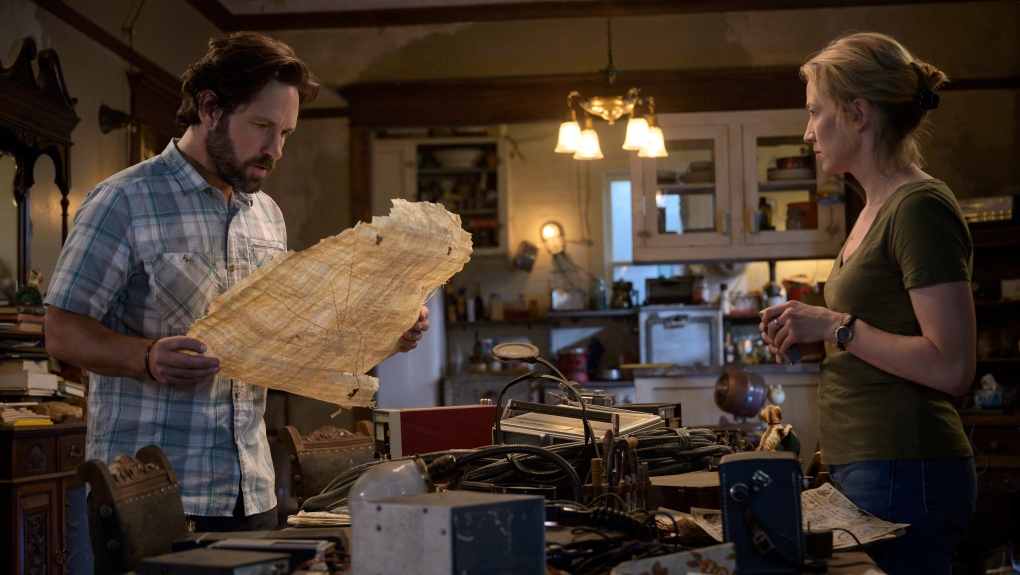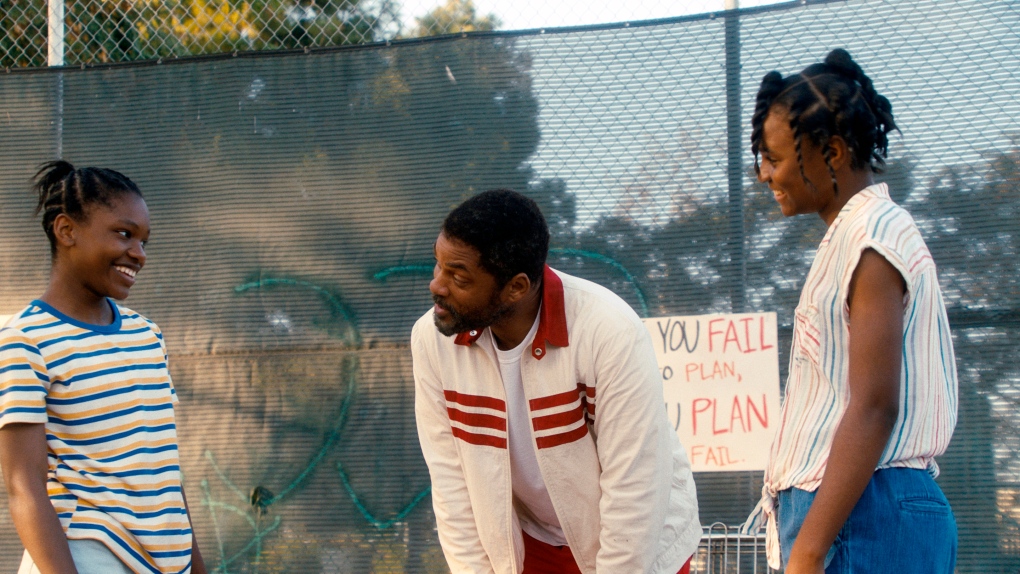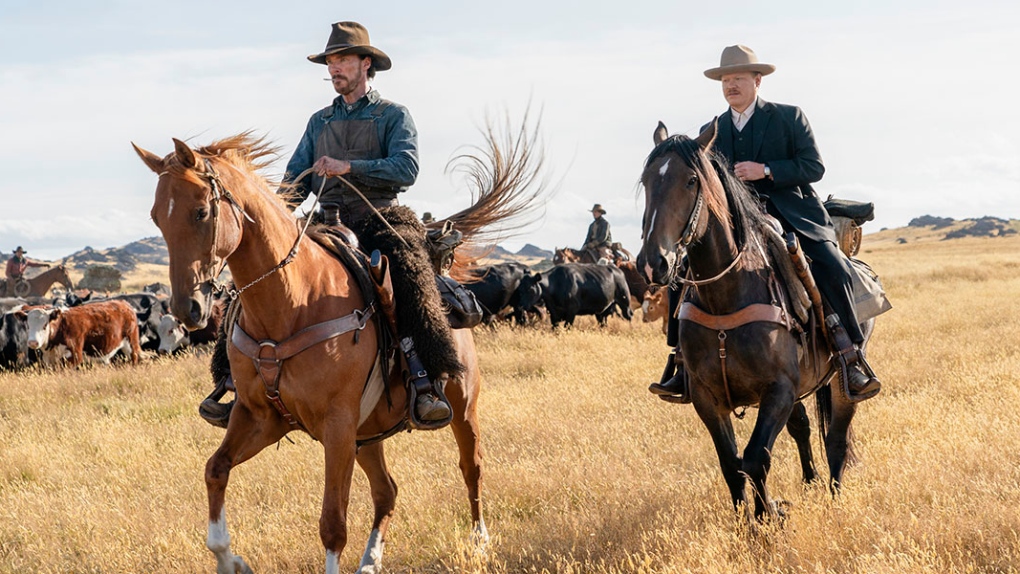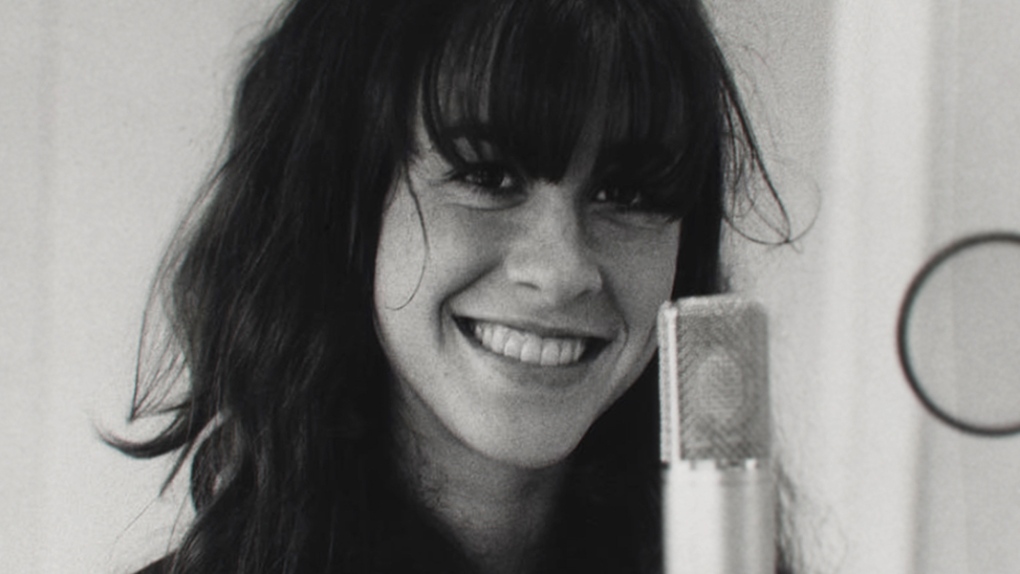GHOSTBUSTERS: AFTERLIFE: 3 STARS
 This image released by Sony Pictures shows Paul Rudd, left, and Carrie Coon in a scene from "Ghostbusters: Afterlife." (Kimberley French/Sony Pictures via AP)
This image released by Sony Pictures shows Paul Rudd, left, and Carrie Coon in a scene from "Ghostbusters: Afterlife." (Kimberley French/Sony Pictures via AP)
With the release of “Ghostbusters: Afterlife,” the supernatural comedy now playing in theatres, the Reitman family proves they ain’t afraid of no sequels. The fourth film in the franchise sees Jason Reitman, son of the original director Ivan, reinvent the series, this time for a younger audience.
The reboot begins with single mother Callie (Carrie Coon) inheriting a rundown old house from her estranged OG (Original Ghostbuster) father Egon Spengler. Located just outside the tiny town of Summerville, Okla., it’s “worthless aside from the sentimental value,” but Callie is desperate. She’s been evicted from her city apartment and sees the move as a way to start a new life for her two teenage kids, Trevor (Finn Wolfhard) and Phoebe (Mckenna Grace).
“We're completely broke,” Trevor tells a friend. “And the only thing that's left in our name is this creepy old farmhouse my grandfather left us in the middle of nowhere.”
Summerville is far from New York City, the original epicentre of "Ghostbusters'" supernatural activity of "human sacrifice, dogs and cats living together and mass hysteria," but it turns out the sleepy little town is also haunted. Phoebe, who takes after the grandfather she never met, is sensitive to the ghostly goings-on and with the help of her grandad’s old ghost traps, new mentor Mr. Grooberson (Paul Rudd) and some familiar faces, she will attempt to get to the bottom of the paranormal problem.
Despite the Reitman name front and centre, “Ghostbusters: Afterlife” doesn’t really feel like a “Ghostbusters” film. There is plenty of fan service and callbacks to the original movie, but the humour is muted and the anarchy of the first film is replaced by family drama. Modelled after the kid led adventure movies of the 1980s, it feels more like a coming-of-age indie grafted onto a big studio premise.
Reitman populates the film with likable characters. Grace nails the nebbish Phoebe, creating a deadpan, wise-beyond-her-years character that blends seamlessly into the “Ghostbusters” world and as her sidekick Podcast, Logan Kim is a scene-stealer. The adults, Coon and Rudd, acquit themselves well, and Dan Ackroyd’s first scene is the best role he’s had in years.
But despite the characters the story takes too long to get to the ghostly stuff. Once there, it delivers a proton blast of nostalgia and an epic CGI supernatural showdown, but at twenty minutes longer than the original, it feels stretched.
“Ghostbusters: Afterlife” attempts to pay tribute to the franchise while moving it forward in a different direction, but despite a couple stand out performances, it is a ghost of the original.
KING RICHARD: 4 STARS
 This image released by Warner Bros. Pictures shows Will Smith, center, with Demi Singleton, left, and Saniyya Sidney in a scene from "King Richard." (Warner Bros. Pictures via AP)
This image released by Warner Bros. Pictures shows Will Smith, center, with Demi Singleton, left, and Saniyya Sidney in a scene from "King Richard." (Warner Bros. Pictures via AP)
Like all good sports films “King Richard,” the crowd-pleasing look at the early life of tennis superstars Venus (Saniyya Sidney) and Serena Williams (Demi Singleton), isn’t really about the sport. Sure, the action builds toward the climatic 1994 tennis match that made Venus a household name, but it is more about the back-and-forth between the family members than it is about batting a ball back-and-forth.
Executive-produced by Venus and Serena, “King Richard” begins with a plan and determination.
Compton, Calif. parents Richard Williams (Will Smith) and Oracene "Brandy" Price (Aunjanue Ellis) are raising their five daughters with love, discipline and a plan. Tunde (Mikayla LaShae Bartholomew), Isha (Danielle Lawson) and Lyndrea (Layla Crawford) are all successful students in school, top of their class, but the film focusses on Venus and Serena, the tennis prodigies and subjects of Richard’s 78-page plan. It’s a bulky document written before their births, that lays out the steps to personal and professional success on the tennis court.
Richard’s mantra is, “If you fail to plan, you are planning to fail.”
He is tireless in his devotion to Venus and Serena, training the pre-teens on a neighbourhood court as if they were already playing at a professional level. The odds are stacked against them -- the chances of one family producing this kind of genius, Richard is told, is like one family producing two Mozarts -- but their talent, nurtured by both Richard and Oracene, and an unwavering allegiance to the plan, point them in the direction of Wimbledon and beyond.
“I think you might have the next Michael Jordan on your hands,” says tennis coach Rick Macci.
“No,” Richard replies, “I got two.”
“King Richard” may be the most inspirational movie of the year. Maybe ever. There is uplift in almost every frame. From Richard’s unswerving support for all his children and Oracene’s ability to always know the right thing to say, to Venus and Serena’s journey to the top in a sport typically dominated by white people, the movie exists in a tidal wave of heart-warming emotion.
It is occasionally cloying, but Smith, in a career best performance, finds the complexities in Richard’s character. To call him single-minded is an understatement. “You are the most stubborn man I ever met,” says Paul Cohen (Tony Goldwyn), “and I coach John McEnroe.”
In real life, the press asked Richard if he was a dreamer or a huckster, but the film digs deeper to reveal a man whose worldview was formed by childhood trauma. He wants his kids to have the childhood he never did, one filled with love, achievement and safety. Some of his most baffling decisions, in terms of the advancement of their careers, are rooted in his desire to protect his daughters, not exploit them.
When Venus wants to go pro at age 14, he tells her that decision is about more than the game. She will be representing “every little Black girl on Earth,” he says, and he wants to protect her from that burden for as long as he can.
Smith is both cocky and vulnerable in the role, using his trademarked charisma in a different way. His usual swager is gone, replaced by determination and obstinacy, and it is a fascinating character study.
Smith is surrounded by a terrific cast whose naturalistic performances set the tone for this family drama.
“King Richard” doesn’t reinvent the biopic wheel. Characters still make big pronouncements like, “Forget Ali and Frazier. If she wins this will be the biggest upset in the history of sports,” and it follows a linear path, but the indelible message of the power of family resonates.
THE POWER OF THE DOG: 3 ½ STARS
 A scene from 'The Power of the Dog.' (Courtesy TIFF)
A scene from 'The Power of the Dog.' (Courtesy TIFF)
“The Power of the Dog,” now playing in theatres before making the move to Netflix, is a story of self-loathing that is equal parts straightforward and exasperating. Much like its main character, Phil Burbank (Benedict Cumberbatch), the movie has moments of interest, but is ultimately frustrating.
The film begins in mid-1920s Montana. The Burbank brothers, Phil (Cumberbatch) and George (Jesse Plemons), are wealthy ranchers and polar opposites. The only thing they seem to have in common is a reverence for their mentor, the deceased rancher Bronco Henry.
Phil, we learn, studied the classics at Yale, but prefers to live a basic life. He likes the company of horses and the ranch hands, rarely bathes, and is quick with a cruel remark.
George is a gentleman rancher. He wears suits, topped with a bowler hat, throws dinner parties at the family home and falls in love with Rose Gordon (Kirsten Dunst), a widowed restaurant owner with a gay son named Peter (Kodi Smit-McPhee) who wants to study medicine like his late father. Although he says he’s happy not to be alone, George takes Rose for granted and she turns to the bottle.
Rose’s presence brings out the worst in Phil who takes every opportunity to belittle his brother’s new wife, and catcall her son. Peter is a quiet presence on the ranch during his school break, but as time goes on, it is clear he sees himself as his mother’s protector. “When my father passed, I wanted nothing more than my mother's happiness,” Peter says. “For what kind of man would I be if I did not help my mother? If I did not save her?”
“The Power of the Dog” isn’t so much driven by its narrative as it is by the characters and an intense central performance.
As Phil, Cumberbatch is an enigma. An unwashed and gravelly-voiced bully, his guard is constantly up. Cumberbatch and director Jane Campion slowly reveal bits of Phil’s backstory through subtle references and scenes. We never get a full picture, and fear of revealing spoilers prevents me from elaborating, but it appears the character’s self-loathing and fragile masculinity seem to drive his vile behaviours. Cumberbatch maintains the mystery of the character, while allowing the odd slip of vulnerability appear, even if it sometimes feels as if he’s playing a studied caricature of a cowboy.
Campion delivers the material in a slow burn. Tensions build, but the level of repression on the screen prevents total engagement with the characters. By the time the end credits roll, “The Power of the Dog” proves itself to be a beautifully crafted film with a handful of emotional scenes, but an underwhelming overall effect.
JAGGED: 3 ½ STARS
 Alanis Morisette in 'Jagged.' (Courtesy TIFF)
Alanis Morisette in 'Jagged.' (Courtesy TIFF)
After the 1995 release of Canadian singer Alanis Morissette’s “Jagged Little Pill,” it seemed like songs such as "You Oughta Know," "Hand in My Pocket" and “Ironic” were pouring out of every radio, turntable and CD player in the world. The album was a juggernaut, vaulting to the top of the charts and making Morissette a superstar in the process.
“Jagged,” a new documentary from director Alison Klayman, details Morissette’s early Canadian success, her rise to fame, the making of the album and the exploitation she suffered as a teen star.
At its bedrock, “Jagged” features an amiable interview from Morissette, barefoot, curled up in a chair recounting the events of her life. It should be noted that the singer has since denounced the film as "salacious," "reductive" and “not the story I agreed to tell.” Nonetheless, in the interview she appears to be open, forthright and helps capture the excitement of her sudden ascent to fame.
The early years section of the film covers her as a young pop star, often treated as a commodity by the record industry. Puberty brought with it an eating disorder, sexual harassment and a dip in popularity. A move to Los Angeles offered an opportunity for reinvention, and, working with co-writer Glen Ballard, she crafted the rock-oriented “Jagged Little Pill” which would on to sell more than 33 million copies globally.
The film makes good use of concert footage and home movies to portray the whirlwind of Morissette’s journey from unknown to superstar, from clubs to stadiums. It provides context in terms of time and place and the fortunes of women in rock at the time.
However, the one question everyone seems to want answered -- who exactly is “You Oughta Know” about? -- goes largely unanswered.
What “Jagged” does best is give Morissette her due as someone who weathered the storm of worldwide success, and emerged on the other side, bloodied, but unbowed.
While occasionally feeling like a music video, “Jagged” does capture the surreal energy that comes along with roaring into “overnight” fame.














































